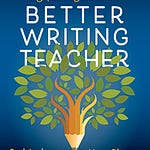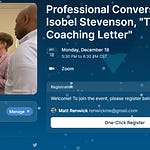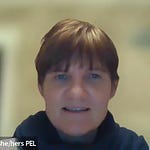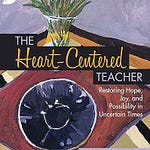Where do we start when striving for equity? What does this concept mean in everyday classrooms? How does a relevant curriculum lead to a more equitable education?
I explore these questions with Dr. Chaunté Garrett, superintendent at Rocky Mount Preparatory School in North Carolina. She is an instructional leader with building- and district-level experience in transforming schools and leading students to high achievement levels.
This episode offers practical ideas for any teacher or leader to apply, for example asking students what they want you to know about them as the first question of the school year. When we approach our roles as a learner first and create holding spaces for others, students can create their own narratives for success.
Enjoyed this post but not subscribed? Sign up today for weekly publications around literacy leadership. Most articles and all podcast episodes are free.
Relevant Resources
Dr. Garrett’s Educational Leadership article, “Relevant Curriculum is Equitable Curriculum”
Listen to this episode on Apple - and rate this podcast!
Full Transcript
Matt Renwick (00:00):
Where do we start when striving for equity? What does this concept mean in everyday classrooms? How does a relevant curriculum lead to a more equitable education? I explore these questions with Dr. Chaunté Garrett, superintendent at Rocky Mount Preparatory School in North Carolina. She is an instructional leader with building and district level experience in transforming schools and leading students to high achievement levels. This episode offers practical ideas for any teacher or leader to apply, for example asking students what they want you to know about them as the first question of the school year. When we approach our roles as a learner first, and then create holding spaces for others, students can create their own narratives for success.
Matt Renwick (00:43):
Welcome Dr. Garrett, thanks for joining me today.
Dr. Chaunté Garrett (00:47):
Thank you for having me. I'm glad to be with you. Thank you.
Matt Renwick (00:51):
You are a superintendent of a K-12 charter school district in North Carolina and also taught high school math. Anything you want to add?
Dr. Chaunté Garrett (01:01):
To that? No, I just positioned myself as a learner, in the spaces that I have the privilege of serving in, even capacities, you know, such as spending time with you this morning. So I collect all of my experiences as learning opportunities in order to be the best and wherever I am sent in that time or the next time.
Matt Renwick (01:29):
And that's how I came across your work, as you very much presented yourself as a learner. What a powerful story in that Educational Leadership article. It's titled Relevant Curriculum is Equitable Curriculum. And I just thought it really nicely encapsulated what equity needs to be about, for all of our students. I loved your story about being accelerated, I don't know if that's the appropriate word, to sixth grade, and just seemed life altering. Can you just share that part of your learning journey and just how it made a difference for you?
Dr. Chaunté Garrett (02:11):
Yeah. You know, when I taught high school math, I would open up my high school math class with a story related to that, to my time in Mr. Bryant's sixth grade elective. Because I struggled in math and that was one of the reasons why I became a math teacher, because I finally found a space where I excelled in math and really realize math was something that I could do and not just do, but do well. And so even, you know, the story reads I was placed in Mr. Bryant's math class by happenstance. And I don't know if you saw, but I was able to present Mr. Bryant with a framed copy of the article, because that was the least I could do for what I gained as being in his math class.
Dr. Chaunté Garrett (03:06):
But one of the things I shared with him in that moment is that I wasn't Chaunté Garrett, the smartest of a sixth grade class that got placed in Mr. Bryant, seventh grade elective, that wasn't the case. We all came to Mr. Bryant's class, that was just a space where it wasn't questionable, whether we could do math. It was just our ability to enjoy it. You know, being able to enjoy it. When we got to that classroom, our ability to do math just was not a question. He treated us like we could do math. He taught us like we could do math. He coached us, like he expected us to do better in math. And he created understanding for us as though we were supposed to do math. He had extremely high expectations for us. And that was just the context of the classroom period. So, you know, I walked into a space where I was carrying this baggage of the struggle I was going to have, the challenges, how long was it going to take me to do the assignments and all that kind of stuff. And it just opened up this world of not only I can do this, but I can actually excel. And every last one of us sitting in the seats, in those classrooms, we're no different.
Matt Renwick (04:35):
And that seems to define equity. I mean, at least an outcome of what we would want to see. And, I really liked your definition in the article. I've shared it with my teachers. They can actually, when I forget one part, they can say, oh, it's meeting students where they are. You define equity as giving students what they need to support their success, meeting students where they are, or/and breaking down barriers to success. So what does that look like in your classrooms or school-wide in your district?
Dr. Chaunté Garrett (05:08):
So, you know all schools and districts have been really challenged. You know, this year I haven't met a leader that hasn't dealt with inequities. And even before that time, we know that they existed. I remember times where we just have to say out loud in professional development. We're not dying on the hill of the pencil. The kid comes to class without a pencil, give them a pencil and let's keep this movement. Like we're not losing instructional time over this. So what we're talking about, giving them what they need to be successful, it is that matter of resources. So one of the things with this pandemic that we did this year was, each quarter we sent home school supplies. I don't just mean like, their textbooks and, and we did the devices, but it was so much more than devices, right?
Dr. Chaunté Garrett (06:11):
It's what happens on the other side of the device and the ability to access school and learning when we got the devices when they were in the kids' hands. And so we, whatever it is, were are they going to need crayons? We sent home crayons. How are we going to assess their learning? We sent home whiteboards and markers so that they can hold them up in the screen until we came up with the better solution. We were trying to send home document cameras, but they became at a short supply as well. And so it was making sure that however, we have to do education, we set our scholars up for success by making sure that their access to materials was not going to be a barrier.
Matt Renwick (07:01):
That's a great idea. Just the quarterly supplies home, access what they need. Um, so it's a challenge, and we talked about this prior, but the challenge with making a curriculum relevant and equitable is you want it to be consistent as well. And sometimes teachers are given scripts to follow and consistency is great, but they can also create gaps. Just in your experience, help teachers work within these constraints to make instruction meaningful for kids.
Dr. Chaunté Garrett (07:29):
Yeah. In the article, I talked about the way Mr. Bryant made math live for us, but he made math live for us because he attached it to things that we knew. He attached it to things that we valued within our communities. He attached it to people that were images and reflections of who we aspire to be within our community. And so when we talk about relevant, so often we can get stuck on the script. They'll talk about basketball, baseball, soccer, dance class, and think that they're creating relevance around these activities that may not even be inclusive for all the students that may sit in a classroom. And so the onus is on us as educators to know what our students, we call our students scholars, what our scholars and what our families value and make that a part of the curriculum. So how does this live out in your day to day life? Not just monitor or not just the way this curriculum manual states it, because there's so much more.
Matt Renwick (08:44):
And I liked that question you had in there. Near the end of the article, I think it was, "What's one thing that you want me to know about you?", At the beginning of the year. I think would just set the tone for not just your instruction, but the entire community in your classroom.
Dr. Chaunté Garrett (09:02):
You know, we're starting a college and career academy and yes, that is very much about becoming more equitable, a more equitable community in terms of access to opportunity. But we opened that meeting with, "You are here tonight. What is it that you want for your scholar to have at the end of their high school experience?" And while there are some things that were the same, there were also some variations because that's what matters in those families, cultures in their lives, and in what they're trying to pursue. And that's a great way to start a connection, but it's also a great way to build understanding of even where to go to build this context. Yes, this takes work because we don't all live in each other's world, but it's the work that's worth doing when it comes to educating our students.
Matt Renwick (10:03):
Nice, and you kind of related, you talk about the harm we might cause when we strive to create equity in our classrooms in schools or help us not always helpful. Can you say more about that, and just maybe what educators might want to be aware of as we strive for equity.
Dr. Chaunté Garrett (10:19):
Yeah. So when you're really striving to, one of the terms that we here use now is hold space. So we want to create space for kids to be processing what what's happening in our world. The racial trauma, the injustices, all of those things that are taking place and realizing that they may not impact everyone culturally the same, but it is impacting everyone, period. And so you have to one, which is also one of the reasons why I'm positioning myself as a learner right now, is you have to position yourself as a learner, as an educator. Try to understand and gain understanding as to what these events may mean. You also have to position yourself in truth because there are some things that have become political that just are not political.
Matt Renwick (11:31):
There's not two sides to certain things.
Dr. Chaunté Garrett (11:35):
Exactly. So, you know, one of the things when I had a teacher come up to me and say, "Dr. Garrett, how am I going to hold a conversation about this?" You're going to hold it in truth. We will stand in front of our kids and teach truth every single day. And it's making sure that we are not recreating trauma, the images of black men dying in the streets and being beaten. They don't have to be the images that we put in front of our children in terms of holding space. They've seen enough of that. They have it at their fingertips with their phone. Facilitating that process of healing does not start there. And I want educators to be careful about recreating traumatic experience in the name of helping people understand. And I'll also want educators to be thoughtful about making sure and being intentional about placing affirming identities in front of students or affirming students' identities by placing affirming images and opportunities in front of them.
Dr. Chaunté Garrett (12:55):
So when we talk about cultural relevance in our school community, we talk about it from the responsive perspective. We don't ignore what's happening in the world, because we want our scholars to be able to process and critically think about their role in making change in terms of relevance. We get to know our scholars and their families and their backgrounds, and that becomes the context of their learning. It doesn't mean that you don't follow standards. It means we show them how they, their lives, their cultures contribute to the learning that they are seeking and what they are learning about the world. We affirm their identities and the identities that they are developing and becoming for themselves. And that means that we don't place images and in contexts that is harmful and traumatic, and we help them attach themselves to those images and contexts that are affirming as they are pursuing.
Matt Renwick (14:02):
And then the way you described this makes it very doable. I think sometimes we try to overthink this or try to think of what topics or subjects are we going to bring in, and we just need to listen to our kids and our families and start with an opening here. So just to kind of wrap things up, you've listed a variety of ideas here to create a more equitable space and help kids feel valued. What's one thing that you would recommend a leader or a teacher do just to continue to hold that space, that holding environment and within their communities.
Dr. Chaunté Garrett (14:46):
This is where we always start year. Know the story before you create the story. And so it's going straight to the source. And as Brene Brown says, "We always come up with our first draft. Nix the first draft; go straight to the source." And that's where you start, with your understanding to begin the work that needs to be done within your community. And if you have a minute, I want to go back to the number two. Because it's about the resources, but it's also closing those gaps on experiences too. Just like our kids come to school with varying abilities to fulfill the supply list and all that kind of stuff and get the tools, part of that resource gap is those experiences and exposures.
Matt Renwick (15:52):
Background knowledge
Dr. Chaunté Garrett (15:53):
Exactly. You know, there are things that affluent families have access to, you know, even if it's piano lessons, participating in different types of athletics, outside of school, you know, music, what have you, those things outside of school that enhance what's being learned inside of school and creates those opportunities for acceleration. And so it's about our schools developing those partnerships. If you can create them within your community, that also adds those additional exposures and experiences. It's about hosting those clubs and creating space and time to be more inclusive so that more students, especially those that may not have access to them outside of school, can have access to them. And that's another way to break down the barriers, but it's also about having those hard conversations around our policies and our practices for many of us, you know, that technology policy slapped us in the face when the pandemic came. And so what are those other things that aren't serving our marginalized and minoritized communities well, and having hard conversations about the why and dismantling those.
Matt Renwick (17:26):
Well, thank you. This has been very helpful for me, as I am a learner too, and to continue to expand my perspective. So thank you, Dr. Garrett.
Dr. Chaunté Garrett (17:40):
Thank you. Thank you very much. I'm glad to be with you.















Know the Story Before You Create the Story